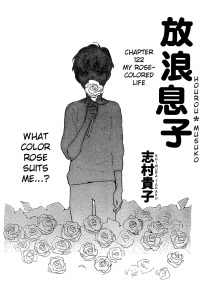 |
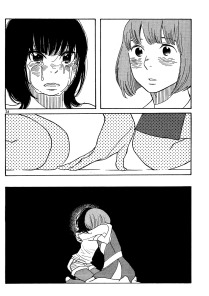 |
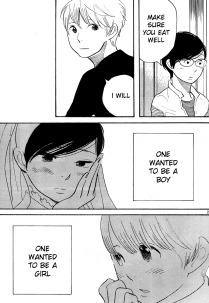 |
“My Rose-Colored Life/For You”
“There were two children. One of them wanted to be a boy. One of them wanted to be a girl. One of them stopped wanting to be a boy. That’s all there is to it.”
Since Takako-sensei has chosen to sum up Hourou Musuko herself in its final pages, it would hardly be right to try and elaborate too much. There you have it.
If you’ve been reading my posts, you know I’ve seen this coming for a while. There was just something in the way Takako Shimura was presenting Nitorin’s life over the last year that had an air of finality to it. The issue, of course, is that there’s really no way to wrap up a character-driven manga like this that’s going to be truly satisfying. Plots can be wrapped up neatly enough (though they certainly aren’t in every case) but lives go on. Anywhere Hourou Musuko stopped was going to be feel like jumping off a moving train.
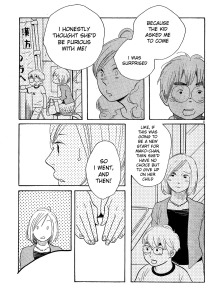 |
 |
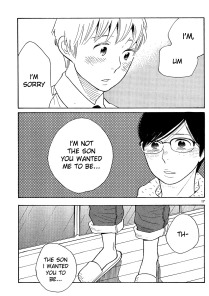 |
If anything, I think it would be fair to say that things felt a bit rushed. All the major players got at least a touch-base in the final chapter, but it was brief – and brief for Takatsuki, too. Ironically my favorite moment probably came when Nitorin spoke with his mother, a minor character in the scheme of things. “I’m sorry I’m not the son you wanted.” he tells her. “You don’t know what I want.” she replies. It’s a simple, profound moment, and she expresses so much in those words – weariness, irritation, bemusement, and most of all unconditional love.
A brief sendoff for someone like Mr. A (he tells his arranged marriage partner about his secret and she stops calling, but he’s glad he told her anyway) feels fine – he’s a bit player – but fans of Chiba and Takatsuki will surely have wanted more. Chiba ends up being confessed to by Doi of all people (boy, there’s a callback to early in the story) and there are some signs she may finally be growing out of her judgemental nature. Mako gets a little more room to breathe – there’s some significant background on his decision to seek Yuki’s help in following her path, including a visit to his Mom – who’s understanding nature gives Yuki a bit of a shock. Hourou Musuko has been accused of painting a bit of a rose-colored picture by making the world of Nitorin, Mako and Takatsuki a more understanding place than it really is – and perhaps there’s something to it. But it’s still nice to think of mothers who love their children for who they are, not who they aren’t.
 |
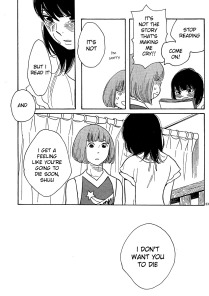 |
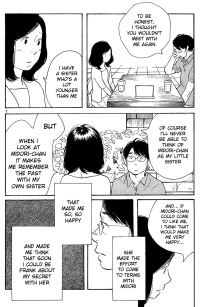 |
As for Takatsuki, though she’s had a minor comeback of late her role in the story has diminished substantially over its final third. There were those, I’m sure, who hoped Shuu and she would end us as a couple, and others who hoped she’d decide she wanted to be a man after all. But I have no issues with either thread – the first, because Shu’s relationship with Anna is so believable and meaningful. And the second, because it seems that for Takatsuki, this ended up being a journey towards being comfortable in her own skin. The fact that she got there certainly shouldn’t make anyone resent her. Her finals panels were still sad ones, though – she asks to hold Nitorin’s hand one last time and he silently takers her hand in his. It’s clear Takatsuki is still very much in love with Shuu, but their clocks were just never in synch.
And for Shuu, there will be room for interpretation, just as Takako-sensei intended. I think the most mysterious line of the final chapters is Anna’s, where she says after reading some of his story, “I feel like you’re going to die soon, Shuu. I don’t want you to die.” Is she referring to the death of the Shuu she loves – the boy? There can be no question that Nitorin has retained his desire to be a girl, but neither is there any question that he loves Anna deeply (it’s implied strongly that they have sex in the final scene). But what exactly does Shuu’s desire mean? Is he going to follow Yuuki’s path, or that of Mr. A – or one of his own? When he reveals his continued desire to Anna, she half-jokingly asks “Hey – does that make me a lesbian?”
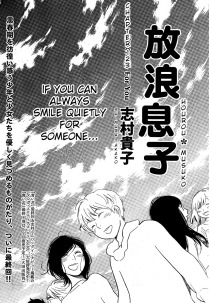 |
 |
 |
I think the answer is, make your own answer – but for me, I think it’s “I don’t know”. I don’t know because Shuu himself doesn’t know – the only thing he’s decided is that he’s going to be true to himself. I can think of few series whose characters I worried about more than Hourou Musuko, and no characters in Hourou Musuko I worried about as much as Shuu. That’s a tribute to the incredible job Takako has done in creating these wonderful characters, but despite all my worry I have a steely confidence that Nitorin is going to be all right. He’s a beautiful spirit – kind and gentle and perceptive and generous to the core, and much stronger than anyone would guess at first glance. He’s showed incredible fortitude and self-belief as he’s gone through all that he has – including all the inevitable self-doubt – and this is the essence of what his mother meant. How could any parent not be thrilled to have a child as profoundly noble and special as he is?
As I’ve said many times, the magic of Hourou Musuko for me is in its ability to create a story that’s about kids that are totally unique and facing highly unusual problems, yet have it feel completely universal. This is every bit as great a series when it focuses on the larger trials of adolescence as a whole as when it focuses on gender issues – probably even better. It’s very, very special – one of the finest series about growing up in the history of manga – and not having a new chapter to look forward to every month leaves a pretty big hole in my heart. That’s why open-ended conclusions aren’t such a bad thing – each of us who loved the series can imagine our own future for Nitorin, Takatsuki, Saori, Mako and Anna. A series about the time in our lives when the everything is changing at blinding speed shouldn’t end with definition – it should end with endless possibility, because that’s what life holds for these wonderfully interesting kids.
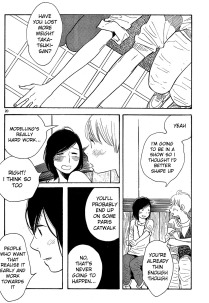 |
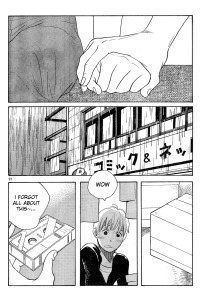 |
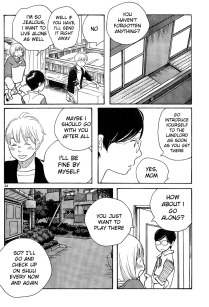 |
 |
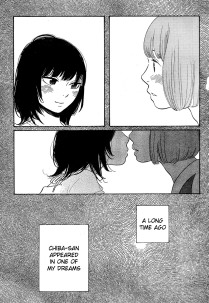 |
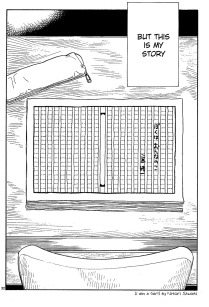 |


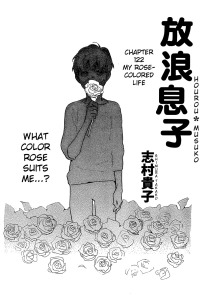


CherylHew
July 24, 2013 at 3:32 pmHello there *waves* Stalker coming out of the woodwork to comment on one of the most amazing manga to have ended recently. At first when I read the last two chapters, I did not even realise it was the end until a while later when I was going through the reader site again. Then I reread them. And raged. And smiled. Because I hate not getting proper closure, but I acknowledge this sort of ending is the perfect ending for a manga like Hourou Musuko. There will never be a definite 'end' for Nitorin and co; they are not heroes who beat some dark lord, they are humans coming in terms and living their lives. I also found that scene with his mother to be especially profound. All in all, my view matches yours almost perfectly.
By the way, great blog 😀 I loved following your Shinsekai Yori posts (one of the greatest stories told in anime ever) and am now a fervent follower of your Uchouten Kazoku posts 🙂
admin
July 24, 2013 at 10:12 pmCheryl, thank you for uncloaking! I'm not surprised it was the finale of this amazing manga that did it.
ishruns
July 24, 2013 at 5:58 pmNice ending, I read a few of the first chapters and kept it on hold but I might pick it back up. Nice banner by the way. Very true to the personalities of Gon and Killua.
Rannta
July 24, 2013 at 8:59 pmIn the end I like that nitorin and takatsuki paths make sense. I was troubled because takako-sensei (and the anime) implied in certain moments that all of this was "youthful mistakes". Fortunately, The end reflects the compromise of nitorin with this. Great character and great manga.
Nadavu
July 25, 2013 at 1:19 amI was sad that so little attention was given to the old ensemble from middle school. In retrospective, that was my favorite portion of the series. And while it makes sense for the story to grow apart from that (that's life, after all), I hoped for some big reunion at the finale or slightly before that. Didn't get. I did get Doi confessing to Chiba which was surprising, but those two are my favorite, so I can't complain too much, I guess..
litho
July 25, 2013 at 5:00 amI can see where people are coming from with some of the complaints about the ending. Nadavu's post above about the rest of the cast, for instance.
As someone who has had a couple of friends with similar issues, Hourou Musuko did seem to oversimplify some of Nitori's struggles at times, but then again that's just my 3rd person's perspective/point-of-view. It's obvious that different people in different types of societies deal with stuff differently, but some of the understatement (for lack of better term) really did make some of the issues the cast faced seem a bit more trivial that they were supposed to be.
But still, this was one of the more beautiful endings I've read in manga (never watched the anime) for a while. It started with Nitori, it ended with Nitori. That final page – "I am a Girl" by Nitori Shuichi – was powerful in it's simplicity. It probably helped that I was listening to a song that (imho) suited the final 2 chapters perfectly, purely by coincidence.
MCAL
August 29, 2013 at 5:46 amA little late, but I thought this was a good a place as any to recommend this. Another manga which is dealing with cross-dressing, gender identity issues and even a little bit of homosexuality in a believable and emotionally accurate way. It even uses minimalist artwork too. Although the name sounds like a huge turnoff, don't let that fool you. Anyway it is called "Bokura no Hentai."
Clara Pagett
September 22, 2013 at 12:46 pmThanks MCAL, i'll give that a shot